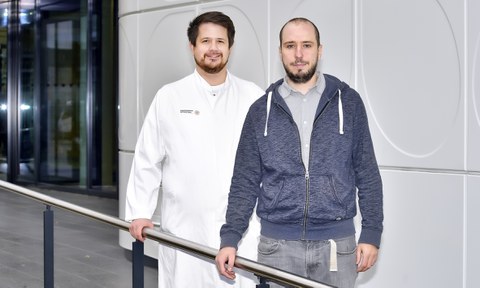Nov 24, 2020
Tracking the epigenome of acute myeloid leukemia by tandem
Since Summer 2020 Dr. Alexander Wurm and Dr. Marius Bill join forces with their research group Non-coding RNAs in cancer at the Mildred Scheel Early Career Center Dresden (MSNZ) - at the National Center for Tumor Research Dresden (NCT/UCC) and the Medical Clinic I of the University Hospital Carl Gustav Carus Dresden to investigate the molecular codes of leukemic stem cells in order to derive possible new therapeutic approaches. In a tandem team, the basic scientist and the clinician scientist will look at the clinical picture of acute myeloid leukemia (AML) from both a scientific and a clinical perspective.
AML is an extremely aggressive cancer of the hematopoietic system with a survival rate between 10 and 40% depending on age. According to the latest findings, this type of cancer shows a heterogeneous molecular appearance. In addition to the blasts, the non-functional, degenerated blood cells, there are so-called leukemic stem cells, which are responsible, among other things, for the initiation of AML. The latter are extremely resistant despite therapy and often lead to a recurrence of the disease.
The focus of the research group is to understand the interaction between certain RNAs, so-called long non-coding RNAs (lncRNAs), and the leukemic stem cells. In previous publications, the researchers were able to show that lncRNAs influence the epigenetic profile of leukemic stem cells. Epigenetic coding determines whether a gene is active or mute. With a better understanding of these molecular processes, it should be possible to understand their role in the pathogenesis of leukemias and their impact on the activity of epigenetic enzymes and to apply them in appropriate oncological therapies.
Alexander Wurm is the biologist in the team and has already gained experience at the university hospital in Leipzig and the Institute of Molecular Genetics in Prague, where his great interest in leukemia research began. Among other things, he worked on the role of so-called microRNAs - a group of small, non-coding RNAs that play a role in the development and treatment of leukemias. In 2019 he moved to the NCT Dresden and extended his research topic in the department "Translational Medical Oncology" to solid tumors. He further has been able to raise various funding, e.g. a research project of the German Cancer Aid on the activin-receptor signaling pathway in chemoresistant AML. Furthermore, he is supported by the Medical Faculty with a MeDDrive Grant, in which he plans to investigate the RNA expression profile in colorectal cancer.
Since mid-2020, the molecular biologist has been working in a tandem with Marius Bill, who previously spent four years as a Clinician Scientist at the Comprehensive Cancer Center of Ohio State University in Prof. Clara Bloomfield's group on clinically relevant issues in AML. Dr. Bill will continue his training in hematology/oncology in Dresden and contribute his daily clinical experience to the joint research projects. Prior to this, he started his residency at the University Hospital of Leipzig, where the two tumor researchers also met for the first time and shared their passion for non-coding RNAs.
"Today, we already understand many details that are crucial for the development of AML. However, we still lack important information about therapy suitability. This is especially true with regard to the new and promising field of epigenetically active drugs. With our work we want contribute to this in the future", said Alexander Wurm. Marius Bill added: "We still cannot help every patient to overcome this serious disease. With better molecular understanding of individual clinical pictures, we will also be able to significantly improve the therapeutic response.
The Medical Campus in Dresden gives an ideal environment for this interdisciplinary research. The NCT/UCC, as an oncology center of excellence, combines high standard patient care with innovative technologies in translational cancer research, thus ensuring the rapid transfer of the latest findings from the laboratory to the clinic. The research group Non-coding RNAs in cancer by Alexander Wurm and Marius Bill now fits into this larger picture as another piece of the puzzle in the fight against cancer.

